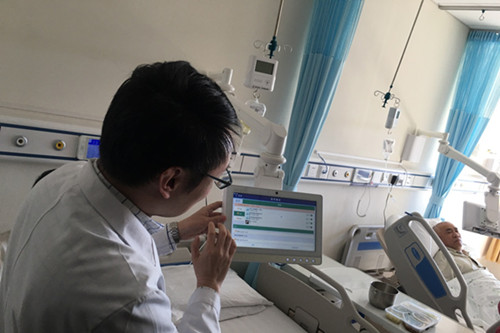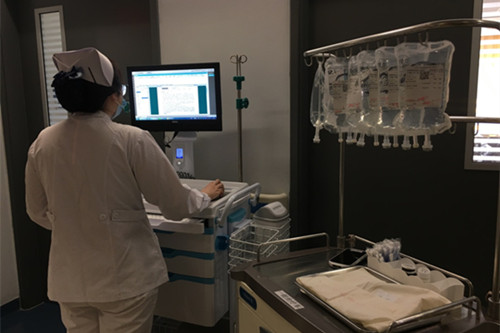Smart hospitals: Chinese hospitals keen on information technology

New Tiantan Hospital in Beijing [Photo/CGTN]
In a world of smart phones, smart cars and even smart toilets, the next information technology breakthrough may be the smart hospital. Patients can enjoy medical services from their fingertips, and a 5G network can even help surgeons conduct long-distance operations. But China's Health Authority says more work is needed in this area.
Open for six months now, New Tiantan Hospital in southwestern Beijing is considered a model for the government's smart hospital campaign. "Through all the outpatient procedures, patients don't need to use cash. Mobile payments and various kinds of auto services make seeing a doctor very convenient", Zhou Jianxin, deputy dean of New Tiantan Hospital says.

A doctor introducing smart devices in a ward of Beijing New Tiantan Hospital [Photo/CGTN]
Outside the hospital bedroom, nurses monitor patients via two big screens. One is for their basic information, the other for their infusion process. In a smart hospital room, a patient can find his/her case report, read doctor instructions, and even order food from a tablet computer. There's also a small box used to monitor the infusion process and send it to nurses. The bed pad can monitor patients' body functions including their heartbeat. And it costs the same as other regular hospital bedrooms.

Nurse getting ready for infusions at Beijing New Tiantan Hospital [Photo/CGTN]
China first pursued the "smart hospital" model 10 years ago, after seeing the concept in U.S. hospitals, which were eager to try trendy technology. "We are discovering how to best apply big data, cloud computing, and Artificial Intelligence to medical practice. Like surgery robots, bone wearing robots and medical AI robots are on the way. They will be researched and put to use very soon," Zhou added.
Last year, China's state council drafted a document to encourage "Internet + medical care" practices. Just a few days ago, the Peoples' Liberation Army General Hospital conducted the nation's first long-distance surgery via a 5G network on a human body -- with a doctor controlling a surgical robot 3000 kilometers away to install a deep brain stimulation device.
But the health authority takes an attitude of "tolerance and prudence" towards such trials, according to Jiao Yahui, deputy director of medical administration bureau of the National Health Commission. "It's not too risky for tele-diagnosis, but tele-surgery demands precision, with no room for mistakes. If the Internet has a problem, we can't just leave the patients on the operating bed. We hope 5G technology can develop faster to assist medical development", she says.
A recent document says the government will evaluate "smart hospitals" by grades. And with a pilot program to set up hospital unions in 100 Chinese cities this year, the "smart hospital" idea will be promoted to share medial resources across hospitals.
- NHC minister visits Cuba
- NHC vice-minister meets with president of GE HealthCare
- NHC minister holds talks with WHO director-general via video link
- NHC minister meets with German health minister
- China to allow wholly foreign-owned hospitals in certain areas
- China's average life expectancy rises to 78.6 yrs


